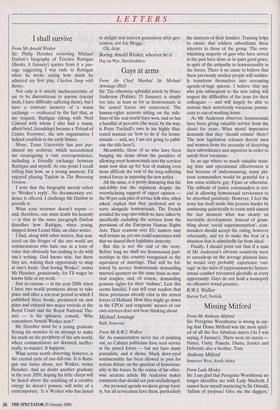LETTERS I shall survive
From Mr Arnold Wesker Sir: Philip Hensher reviewing Michael Darlow's biography of Terence Rattigan (Books, 8 January) quotes from it a pas- sage suggesting I was rude to Rattigan when he wrote saying how much he admired my first play, Chicken Soup with Barley.
Not only is it utterly uncharacteristic of me to be discourteous to anyone (except fools, I have difficulty suffering them), but I have a contrary memory of a warm exchange — evidenced by the fact that, at my request, Rattigan (along with Noel Coward with whom I also had a warm, albeit brief, friendship) became a 'Friend of Centre Fortytwo', the arts organisation I helped establish in the early Sixties.
More, Texas University has just pur- chased my archives, which necessitated me cataloguing a vast correspondence, including a friendly exchange between Rattigan and myself. At one point I recall telling him how, as a young amateur, I'd enjoyed playing Taplow in The Browning Version.
I note that the biography merely refers to `Wesker's reply'. No documentary evi- dence is offered. I challenge Mr Darlow to provide it.
What your reviewer doesn't report — and, therefore, one must doubt his honesty — is that in the same paragraph Darlow describes how Rattigan, when young, slapped down Lionel Hale, an older writer.
I find, along with other writers, that scat- tered on the fringes of the arts world are commentators who hate one in a tone of voice that obviously has nothing to do with one's writing. God knows why, but there they are, waiting their opportunity to snap at one's heels: 'that boring Wesker', writes Mr Hensher, gratuitously, for I'll wager he knows little of my work.
Just as curious — in the year 2000, when I have two world premieres about to take place and after a ten-year period in which I published three books, premiered six new plays and enjoyed two major revivals at the Royal Court and the Royal National The- atre — is his splenetic remark, 'Who remembers Arnold Wesker now?'
Mr Hensher must be a young graduate flexing his muscles in an attempt to make his mark on the periphery of the arts world, where commentators are doomed, ineffec- tually, to wander. It happens.
What seems worth observing, however, is the eternal cycle of rise-fall-rise. It is Ratti- gan one hears about, not Wesker, writes Hensher. And no doubt another graduate in the year 2050, hoping his little chirps will be heard above the crackling of a creative energy he doesn't possess, will write of a contemporary, 'It is Wesker who has lasted to delight and interest generation after gen- eration, not Joe Bloggs.'
Oh, dear.
Boring Arnold Wesker, whoever he is
Hay on Wye, Herefordshire


















































































 Previous page
Previous page